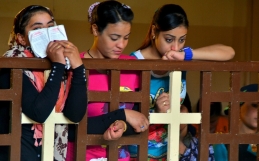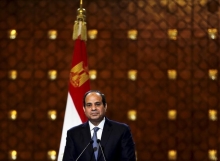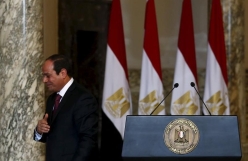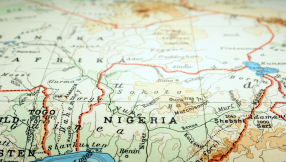A controversial review into the Muslim Brotherhood has been published has ruled the organisation has a "highly ambiguous relationship with violent extremism."
Association with the Muslim Brotherhood should be viewed "as a possible indicator of extremism," the Prime Minister David Cameron said in a written statement summing up the review. Crucially, however, the group will be kept "under review" but not banned or ruled a terrorist outfit.
The report is layered with controversy and could have ramifications for British relations with partners in the Middle East after Mr Cameron was pressured into commissioning the review by Saudi Arabia and the United Arab Emirates (UAE).
Both are key allies of Britain and consider the Muslim Brotherhood a terrorist organisation. According to the Guardian, the UAE threatened to block a billion-pound arms deal with the UK if Cameron did not act against the group.
The report has been repeatedly delayed without explanation although it is understood the Prime Minister wanted to avoid political embarrassment when he discovered the report would not conclude the Muslim Brotherhood were extremists. This would be "unhelpful to the Saudis," according to former Liberal Democrat leader Paddy Ashdown.
Ashdown accused the government of failing to put pressure on Saudi Arabia and other Gulf states which he said were funding jihadis. He told the BBC that the Conservative Party's "closeness" to Saudi princes was to blame for this failure.
The report found the Muslim Brotherhood "is deliberately opaque, and habitually secretive." It said it is not a monolithic group but a "transnational network, with links in the UK, and national organisations in and outside the Islamic world".
As a result it is difficult to make pronouncements about the nature of the group, but the report acknowledged "it has been a rite of passage for some individuals and groups who have gone on to engage in violence and terrorism."
Individuals associated with the group have supported acts of terror rather than the group as a whole, the statement explained.
Cameron said Muslim Brotherhood-associated and influenced groups had sometimes characterised Britain as fundamentally hostile to Muslim faith and identity and expressed support for attacks conducted by Palestinian Islamist group Hamas.
"Aspects of the Muslim Brotherhood's ideology and activities therefore run counter to British values," he said.
The Sunni Islamist group rose to power in Egypt amid the Arab Spring and Mohamed Morsi, Egypt's first democratically elected President, was a member. Although the Muslim Brotherhood used to enjoy support from some Arab nations in the latter part of the 20th century, it is now considered a terrorist organisation by Egypt, Syria, Saudi Arabia and the United Arab Emirates (UAE).
It is also the Middle East's oldest Islamist movement and has long been Egypt's main political opposition.
The publication of the report is one of 36 announcements the government has made on the last day of Parliament before the Christmas recess, meaning there is little opportunity for debate or challenge.
















